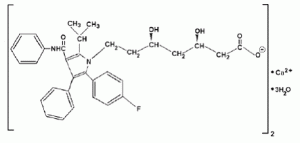 On May 23, 2012, Pfizer announced its teaming with EatingWell magazine to launch a mobile app for patients on Lipitor.
On May 23, 2012, Pfizer announced its teaming with EatingWell magazine to launch a mobile app for patients on Lipitor.
Eight days later, on May 31, 2012, generic versions of Lipitor will hit the market.
Lipitor is the best-selling drug in pharmaceutical history, to-date. Sales of the product top $125 billion. While generic atorvastatin has been available in the U.S. since November 2011 from two manufacturers, low prices for the generic will drop to $10 or less for a month’s supply at the end of May.
This is Pfizer’s first foray into a prescription drug-affiliated app. The free mHealth app, Recipes 2 Go, was launched as part of the Lipitor Smart Living website and is available from the Apple App Store for iPhone, iPod touch, and iPad, and for Android phones and tablets from Google Play. The app includes recipes from EatingWell magazine, a shopping list tool, a timer for cooking, and a recipe search finder. The app also has a copy of the Lipitor $4 co-pay card where patients enrolled in the Pfizer Lipitor for You program can keep their ID and use the digital card for refilling Lipitor prescriptions at the pharmacy.
Health Populi’s Hot Points: Readers of Health Populi familiar with my work know that I’ve studied, tracked, and advised mobile health start-ups and initiatives since their inception. I am no newcomer to this space, having written an early paper on the subject for the California HealthCare Foundation, How Smartphones are Changing Healthcare for Patients and Providers, in April 2010.
With the patent cliff hitting many pharma Mega Brands in and beyond 2012, pharmaceutical manufacturers have the opportunity to create tight bonds between patients and the drug brands they take to manage chronic conditions. However, those relationships take time to develop, and are built on trust gained over time. Is one week time enough for Pfizer to prove its love and support for patients who might download the Recipes 2 Go app? Cheap atorvastatin hits pharmacy store shelves and mail order channels on May 31st. Pfizer has known about generic Lipitor’s launch for several years.
I’ve worked with pharma companies for years addressing this issue. As a forecaster, my work is made difficult when there’s an uncertainty to throw into a future scenario, such as whether employers will continue to sponsor health insurance, how Republican Executive and Legislative branches would re-shape health reform, or how quickly consumers will get engaged in their health care. These uncertainties compel people in my line of work to do scenario planning where we consider many alternate futures in order to develop a strategy that will play out robustly across different future states.
However, prescription drugs going generic have a date-certain. These are not uncertainties. The opportunity for branded pharma to more closely engage with patients and provide value-added services surrounding a pill or therapeutic regimen has been there for years. The fact that very, very few brands have allocated resources to do this strategically and holistically is unfortunate, but is also a reality.
Will a recipe app, co-branded by a stellar cooking magazine (to which I subscribe, FYI), be a Holy Grail for patients dealing with hypercholesterolemia? Will it build trust and value in the brand worth a marginal monthly nut of $20, $30, $50, beyond the generic drug price at discount retail pharmacy or mail order?
Ask me on June 30th, 2012, a month after Lipitor goes generic en masse. My forecast as of today, given what I’ve learned from watching previous generic launches of highly popular branded drugs, is not a happy one for Pfizer shareholders.




 I'm gobsmackingly happy to see my research cited in a new, landmark book from the National Academy of Medicine on
I'm gobsmackingly happy to see my research cited in a new, landmark book from the National Academy of Medicine on 
 Grateful to Gregg Malkary for inviting me to join his podcast
Grateful to Gregg Malkary for inviting me to join his podcast